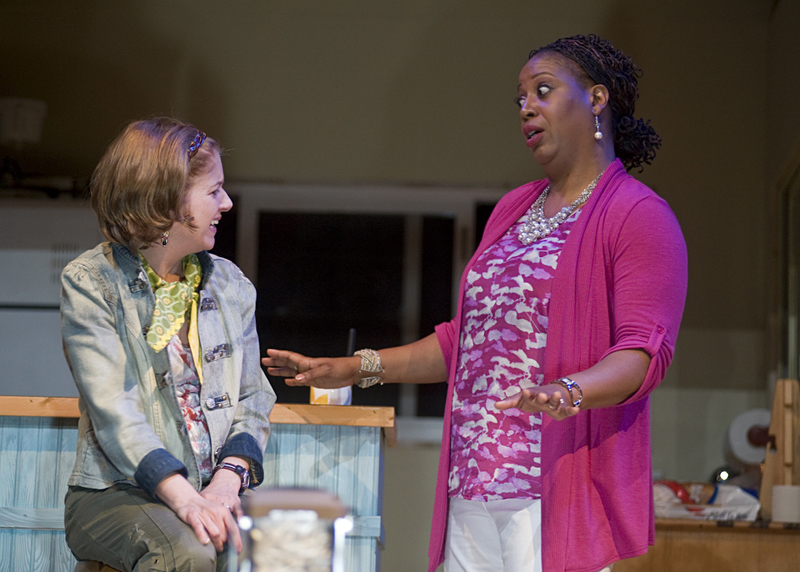If difficult, awkward conversations are the medicine necessary to heal a racially wounded society, at least make them funny. Janece Shaffer’s dramedy does exactly that as five privileged Georgia wives accompany their daughters on a camping trip in Forsythe County—a place known for a 1912 lynching and lingering Klannish sentiments. When white group leader Ali (Casi Wilkerson) sticks the two black moms on kitchen duty in their cabin, a succession of fractures begins. NBA housewife Nicole (Karen Ann Daniels) urges making the best of the situation, while surgeon Deidre (Faith Russell), on edge for reasons we later discover, seeks confrontation. As a storm conveniently keeps the three white and two black women inside (their daughters are bunked elsewhere, never seen), alliances grow and collapse among the quintet. These tempests could have been a muddle were Shaffer’s characters not so precisely delineated.
For white lawyer Sue (Nikki Visel), a Midwesterner on good terms with everyone, race barely exists as an issue. (Her problem is a social debt to Ali.) Jewish Jamie (Amy Love) gets big laughs as the most racially uncomfortable mom, well-intentioned but terrified of giving offense. She’s a perpetual cringe of apology and credential-mongering under her National Black Arts Festival cap (“I love India.Arie! I saw her last month at Spelman College.”).
In a dozen-odd scenes over 90 minutes (with no intermission), nearly every combination of the five women yields a small explosion. Why does Deidre feel so persecuted? Why is Ali’s behavior so insensitive? Why is Jamie so scared? Brownie Points is, admittedly, more than a little schematic in its point-by-point revelation of each character’s hidden hang-ups. Thankfully, however, the women’s resentments feel fairly natural and not too didactic. Deidre’s issues are the most obvious; she permits herself a hilarious happy dance when her nemesis Ali screws up, egged on by Jamie, who admits Jews did the same after Mel Gibson’s disastrous tirade (the 2010 play, making its West Coast premiere, is that topical). Ah, schadenfreude-afflicted humanity!
Taproot’s mandate of “hopeful grappling” is perfectly served by this material, well directed by Karen Lund. Brownie Points isn’t deep, but it’s full of anxious observations that ring true in our post-Obama age of polite, imperfect integration. “The girls arranged themselves by color in the van,” frets Nicole. It’s also noted that Band-Aids match Caucasian-colored skin, that whites often smile at blacks for no reason, and that trees have a different meaning if your ancestors were hung from them. Such lessons, slights, and anxieties are hardly new or unexpected, but Taproot’s cast renders them delightfully.
And, as intended, Brownie Points might even loosen up some awkward conversations after the show.








